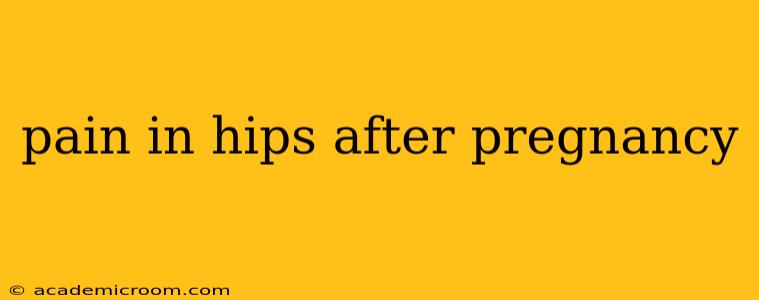Pregnancy and childbirth place immense stress on a woman's body, and hip pain is a common complaint postpartum. This isn't just a temporary inconvenience; it can significantly impact daily life, making even simple tasks challenging. Understanding the causes, effective treatments, and preventative measures is crucial for regaining comfort and mobility.
What Causes Hip Pain After Pregnancy?
Several factors contribute to hip pain after pregnancy. Hormonal changes, weight gain, and the physical demands of carrying a baby and delivering it all play a role. Let's delve into the specifics:
-
Relaxin Hormone: During pregnancy, the body produces relaxin, a hormone that loosens ligaments and joints to prepare for childbirth. While beneficial for delivery, this can lead to instability in the hip joints, making them more susceptible to pain and injury.
-
Weight Gain: The added weight during pregnancy puts extra strain on the hips and pelvis. This strain can exacerbate existing conditions or cause new problems.
-
Postural Changes: As the belly grows, a woman's posture often shifts, leading to changes in weight distribution and increased stress on the hips.
-
Diastasis Recti: While not directly causing hip pain, diastasis recti (separation of abdominal muscles) can contribute to poor core stability, indirectly affecting hip alignment and increasing the risk of pain.
-
Muscle Weakness: Pregnancy and delivery weaken pelvic floor and core muscles, leading to instability and increased stress on the hip joints.
-
Symphysis Pubis Dysfunction (SPD): This condition involves pain in the pubic symphysis, the joint connecting the two pubic bones. It can radiate to the hips and groin.
-
Sacroiliac (SI) Joint Dysfunction: The SI joint connects the sacrum (the triangular bone at the base of the spine) to the pelvis. Dysfunction in this joint can cause significant hip and lower back pain.
How is Hip Pain After Pregnancy Diagnosed?
A doctor will typically conduct a physical examination, assessing your range of motion, palpating for tenderness, and checking your posture. They may also ask about your medical history, including details about your pregnancy and delivery. In some cases, imaging tests like X-rays or ultrasounds may be necessary to rule out more serious conditions.
What are the Treatments for Hip Pain After Pregnancy?
Treatment for postpartum hip pain depends on the underlying cause and severity. Common approaches include:
-
Physical Therapy: This is often the first line of treatment. A physical therapist can teach you exercises to strengthen core and pelvic floor muscles, improve hip stability, and increase flexibility.
-
Manual Therapy: Techniques like chiropractic adjustments or osteopathic manipulation can help realign the pelvis and reduce pain.
-
Medication: Over-the-counter pain relievers like ibuprofen or acetaminophen can provide temporary relief. In some cases, a doctor may prescribe stronger pain medication.
-
Rest and Ice: Resting the affected area and applying ice packs can help reduce inflammation and pain.
-
Supportive Devices: A supportive belt or brace can help stabilize the pelvis and reduce pain.
Can I Prevent Hip Pain After Pregnancy?
While not all hip pain is preventable, taking proactive steps can significantly reduce your risk. These include:
-
Pre-pregnancy Exercise: Maintaining a healthy weight and strengthening core and pelvic floor muscles before pregnancy can help prepare your body for the demands of pregnancy and childbirth.
-
Pelvic Floor Exercises (Kegels): Start these exercises before pregnancy and continue after delivery. Strong pelvic floor muscles provide essential support for the hip joints.
-
Postnatal Exercise: Gentle exercise, as advised by your doctor or physical therapist, is vital for regaining strength and stability.
-
Maintaining a Healthy Weight: Managing weight gain during pregnancy can lessen the strain on your hips and joints.
-
Good Posture: Maintaining good posture throughout pregnancy and postpartum can reduce stress on the hip joints.
What Exercises Can Help with Postpartum Hip Pain?
Many exercises can help alleviate postpartum hip pain, but it’s crucial to consult with a physical therapist or healthcare professional for guidance tailored to your specific needs and condition. They can assess your condition and design a safe and effective exercise program. Examples of exercises that may be beneficial include: gentle hip stretches, glute strengthening exercises, and core strengthening exercises. However, never attempt exercises without professional guidance.
How Long Does Hip Pain After Pregnancy Last?
The duration of hip pain varies significantly depending on the cause and the individual's response to treatment. For some women, the pain resolves within a few weeks or months. Others may experience persistent pain for longer periods, sometimes requiring ongoing physical therapy or other interventions.
When Should I See a Doctor About Hip Pain After Pregnancy?
Seek medical attention if your hip pain is severe, persistent, doesn't improve with home remedies, or is accompanied by other symptoms like fever, numbness, or weakness. Don't hesitate to seek professional help; early intervention often leads to better outcomes. Prompt diagnosis and treatment are key to managing postpartum hip pain effectively and returning to your normal activities.
